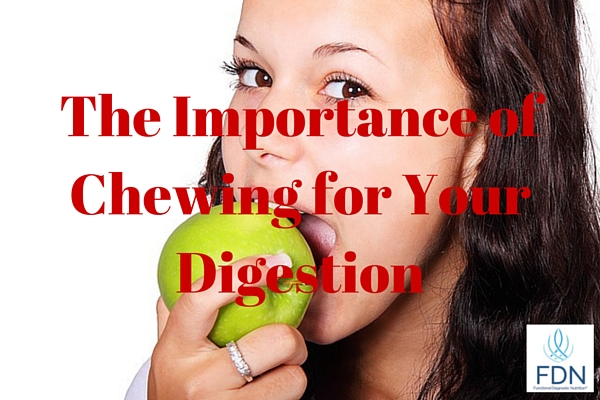How well do you chew your food when you eat? Most people don’t think about this question, and yet how well you chew your food plays a fundamental role on the effects of your daily and long-term health. It is one simple thing that you can do to improve your digestion. Most people are unaware that digestion actually begins with the mouth, and that without proper chewing, you will be unable to adequately digest the food you eat.
Why You Should Chew Food More Thoroughly
When you take a bite of food and begin to chew, it breaks down large food particles into much smaller particles making the food easier for the digestive system to break down and digest. The more you chew, the smaller the particles become, allowing for maximum absorption of vital nutrients. This allows you to get the greatest health benefits from the food you eat.
Chewing food more thoroughly can also help your waistline. Chewing more slowly can be an effective way to reduce the amount of food that you consume because it allows the body’s signals to let you know that you are full. This typically takes 20 minutes after you begin eating. If you are eating more quickly and not fully chewing your food, you ultimately will consume more food, which can lead to weight gain.
Chewing stimulates the production of saliva which lubricates the food you eat. This is important, particularly when eating dry foods. Swallowing fully lubricated food reduces the stress on the esophagus and allows the food to pass through to the stomach much more easily.
The act of chewing releases digestive enzymes into the saliva, which begin to break down the food you eat. These enzymes are necessary to help break down the food in vital nutrients that you body uses to function. The longer you chew, the more opportunity the enzymes have to break down your food, reducing the digestive burden to the stomach and small intestine.
If you do not chew fully, large food particles are then allowed to enter your stomach. Often, these particles are not fully broken down in the stomach and are then allowed to enter your intestines. Once these large food particles reach the intestinal tract, bacteria begin to putrefy the particles, which can lead to bloating, gas, diarrhea, constipation and other digestive complaints. When you chew more fully, it reduces this problem.
When you fully chew your food, it gives you the opportunity to truly taste and savor what you are eating. Eating should be pleasurable. But often, people eat so quickly that they do not get the opportunity to actually taste the food they are eating.
Chewing properly
Many people go through life unaware of how many times they should chew their food for greatest digestive benefit. You should aim to chew each bite at least 30 to 50 times, until the food has a liquid consistency.
So during your meal:
- Remember to put down your utensils in between bites. This gives you time to chew each bite more fully, without loading up your fork with more food.
- Take smaller bites of your food. This will allow you to break each bite down more easily.
- Chew your food until it has a liquid consistency to it.
- Do not take another bite until you have fully chewed and swallowed the bite before. Many people put more food in their mouth before they have even swallowed what is already there.
- Wait to drink any liquids until after you have fully swallowed your food. This will prevent you from washing down food particles that are too big.
- Allow yourself to fully taste each bite. When is the last time you really took the time to be aware of the way your food tasted? Pay attention and you will start to notice subtle things about the taste of your food.
- Many people are distracted eaters. They watch TV, or look at their phones while eating. Focus on becoming a mindful eater and removing any distractions.
- Enjoy good conversation with others over a meal. We typically eat more slowly when talking with friends and family while eating.
- Take a nice walk to help digestion. A gentle walk after eating can help digestion and help blood sugar levels. It is best to avoid vigorous exercise at this time.
It is time to take your digestion more seriously. Learning to chew your food more fully will help you to get the most out of the food that you eat, and getting the greatest benefit can help you to improve and maintain optimal health. Once you establish a healthier chewing routine, your digestion will improve and you will more easily be able to avoid digestive distress and discomfort.







